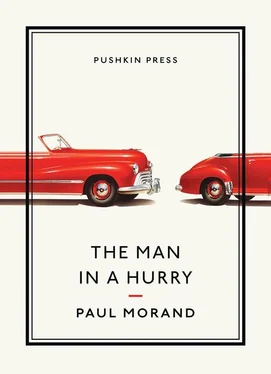“There we are. I’m ready. A quarter of an hour would have been enough; it’s not bad, but it means an hour gets lost every four days, which amounts to about ninety-six hours a year devoted to cleanliness. What a waste of valuable time! One trembles to think of it. How wise I was to give up massage and manicure! The toothbrush still plays tricks on me and so does the toothpaste tube, which always bursts at the bottom. These small luxuries must be sacrificed to the greater luxury that is time. It’s the incidental things that mainly get me down: the brilliantine, the tweezers, etc. There would be good reason to see all this in a sordid spirit of economy of movement: doing away with gargling, for example; not sniffing water through the nasal fossae any longer; putting the métro tickets in my wallet beforehand.”
Here is Pierre Niox standing between two mirrors, the one above the mantelpiece and the one on the wall. Not that he has stopped to look at himself, but while he is in this locality, let us try to grasp this elusive man from both angles. Pierre has washed his hands, but naturally he has not had time to dry them and he is doing so by waving them around like puppets. It is a good moment to examine this example of “instantaneous man” and we shall not have a similar opportunity later in the day because Pierre is catching the eleven o’clock train to Brussels. The slanting light reveals him to be slender, with smoothly rounded skin, a decently shaped face, a prominent nose and surprisingly fine light-blue eyes beneath some swarthy black hair.
The bullet that is fired from the gun does not ask itself whether it is going to make a hole in a cardboard box or shatter a skull; neither does Pierre. Reading this, you might think of him as daring. “There goes a confident man,” people will say, “who is not going to make a mess of things.” Quite the contrary, Pierre is timid because his haste has caused him many a failure alternating with huge successes. And the moral of this story shall be to show that the impatient man is punished more frequently than he is rewarded.
Let us return to the pose: Pierre has the figure of a fencer painted for the Salon des Artistes Français in about 1895, with his locks and moustache newly waxed. With his restless hands, his tremulous lips, his very dark skin beneath which many very dark feelings stir, he could only be French. His clothes are moulded to his body and it would be impossible for a dog to bite him by seizing the seat of his trousers or his sleeve, so neat and precise is the cut.
He walks with his hands plunged into the back pockets of his trousers, which accentuates the hollow of his abdomen. His stomach is concave and below it a watch chain glitters, casting a cold gleam over his Spanish Christ-like body.
Pierre is now reading the newspaper. Or one could say it is reading him. It has thrown itself upon him and is devouring him. He starts at the back page, just as he begins his letters with his signature and the address on his envelopes with the name of the town or the postcode. He can’t help it. He can never help it. Continuing his perusal of the daily newspaper, he finally reaches the bold headlines on the front page and the editorial, makes a ball out of such fine prose and rolls it across the room. This habit dates from the time that Pierre owned a cat and would try to amuse it. But the cat was not amused; the cat remained forlorn, being of a contemplative breed that loathes impulsive people. The cat puts up with noise as long as it is a sound that is repeated. Being nervous, noise upsets it. The cat is purring at the moment. The cat always lives in the here and now whereas Pierre always lives in the following day. The cat thinks and doesn’t move except to defend itself. The cat simmers and never boils over. The cat is a compact creature, a slow-cooking stove. Pierre’s cat would look at its master (though is one ever the master of a cat?) with regret. He had an accommodating nature, but, having put his tail over his eyes to keep out the daylight and settled himself comfortably for the morning, he disliked Pierre’s sudden disorderly entrances and exits. If he were drinking his milk and Pierre suddenly leapt up, he would flatten his ears, lower his tail and stand sideways to drink while keeping watch with an anxious eye; then, his appetite diminished by this galloping, which caused the floorboards to quake, he would set off sadly, with a drip on his chin, to shelter beneath the chest of drawers. One day the cat had had enough. He left via the balcony and vanished.
Having thrown away his newspaper, Pierre checked his watch: “Losing five minutes reading the paper is insane!” He thought that the best way, in accordance with the principle of two things at once if possible, would have been to read it while on the lavatory. A brilliant idea: print the dailies on toilet paper. Furthermore, Pierre never took long over these tasks; among his friends it was a classic joke:
“He does his main business faster than others do their lesser one!”
Pierre looked at his watch again. He lived with his eye on his wrist. Impossible to give a picture of him without this familiar gesture: his arm thrown forward to reveal his wristwatch, then folded and quickly raised towards his face so that he can read the dial. This ever so emancipated man was crucified upon the two hands of a watch; he felt ashamed of this, but has shame ever cured a vice? These tiny scissors carved his day into seconds, each of which, by dint of being too precious, comprised a total which, along with the others, was completely intolerable. On rare occasions, he became aware of his haste and was astonished by it: “Why is it that my heart is beating as though I were running to a romantic assignation whereas I’m simply going to call on my shoemaker? There must be things to slow up the systole: a false clock? Or false time? After all, we artificially create an hour in summer.” At moments like these he considered himself ridiculous and promised to live a calmer life; but he only succeeded in filling his day by wandering around pointlessly in order that he could savour its actual duration, its duration pure and simple. (In such a manner did all Henry Ford’s activity, the working hours he saved, lead to the distractions of a man of straw, to lessons in the minuet.) Placide, who was consulted one day, had suggested some remedies: a sea voyage, during which everything is adjourned (Ah! lower the anchor, otherwise I’ll leap over the guard rail!); shows with long intervals (Oh! better to kill the usherette!); angling (until the sight of the float bobbling about on its own reflection makes you feel ill); shooting (hours spent swivelling on your shooting stick while the gamekeeper grumbles: “It’s due to the wind that’s changed direction, nothing else is going to come over today”). Why not have one’s hair cut? laughed Pierre (No friction, no singeing, no drying, no this…, no that…, and especially no conversation!); wait at the counter of a bank (a French one); immerse yourself in reading L’Illustration at the dentist’s (“Sorry, I had a lady from the country with a large boil”); regattas (All right, let’s be off! The breeze is dropping now!)
“No, we’d have to find something far more ridiculous to block out the passage of time completely: total abstention from all activity. For what consumes us is not so much forced or prolonged waiting as those imperceptible pauses and automatic gestures that make holes like a sieve in one’s day: chewing food, sharpening a pencil, sticking stamps, groping about for the button in a lift, signing a registered letter, filling the radiator with water, waiting for a dog to have done its business, comforting a woman…”
Pierre looked at his watch for the tenth time.
“I don’t believe it! It’s stopped. Chantepie, what time is it? What, you haven’t wound up the drawing room clock! Chantepie, you must mend your ways! As soon as I have some money I’m going to buy myself an automatic clock.”
Читать дальше












